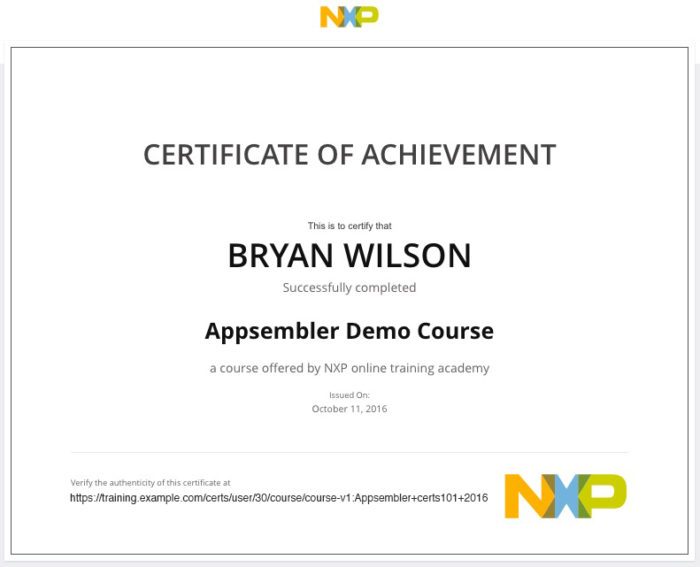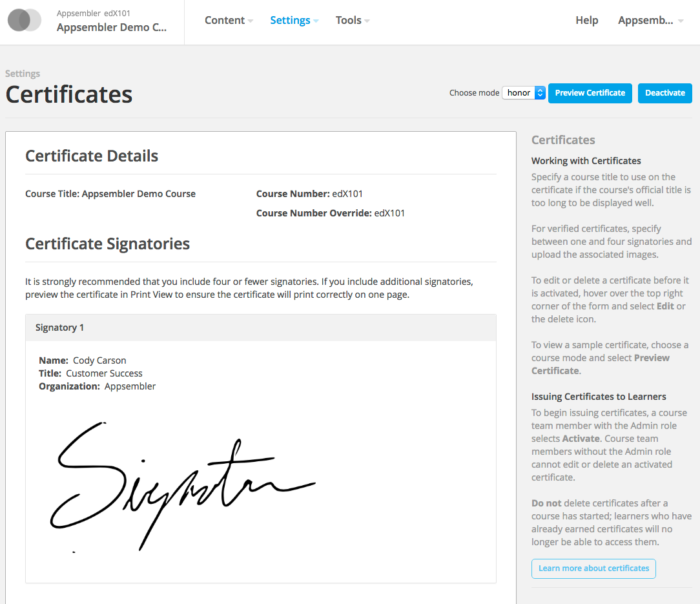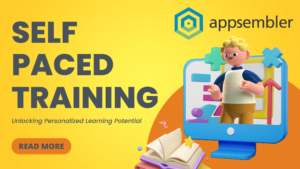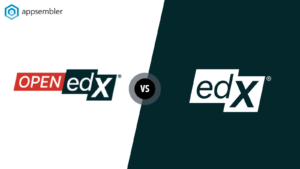One of the important aspects of taking a course on the public edX.org site is the ability to enroll in a “Certificate Track” for a course so that when you’ve successfully complete the curriculum, you’ll receive a certificate of completion, certified by edX.
This works well and intuitively on edX.org, but we’ve seen a fair amount of justifiable confusion over how certificates work on sites powered by Open edX, like those hosted and supported by Appsembler. The online documentation and parts of the Open edX user interface do not make clear what applies to PDF certificates and what applies to web-based. We hope this blog post will shed some light on the matter!
What is a Certificate?
Since its early versions, Open edX has provided the ability for course developers to create a certificate of completion for their courses. The default behavior provides some customization options to course creators in Studio, including adjusting the course display name and adding signatories with signature image files. Additional customizations, like logo customizations, can be made quickly by a developer.
The resulting certificate is generated by Open edX and displayed in the browser (HTML format), and is suitable for printing.
At Appsembler, we have often had customers ask for a PDF version of the certificate. While PDF-based certificates were standard in Open edX for the first few releases, they are now delivered in HTML format. Because PDFs are no longer default behavior for Open edX, we have accommodated these requests through some custom development.

When is a Certificate Available?
For courses that are run on a specific schedule – for example, a college that runs an edX course during the Spring semester – the criteria for getting a certificate are pretty unambiguous: when the semester is over (and the course end date has arrived), you need to have a passing grade for the overall course. If these two conditions are met (course end date has arrived, and you have a passing grade) then on your Student Progress page you will see the option to “View Certificate”.
Self-Paced Courses
But what happens in courses where there is no unilateral end date? Many Appsembler customers offer Open edX courses with rolling enrollment, in which students progress at their own pace. In this case, even when a student has successfully completed the course requirements, the course end date is usually set in the distant future, so only one of the two certificate criteria has been met.
Beginning with the Dogwood release, administrators can specify whether a course is Instructor-paced, in which due dates matter and a course is not complete until the course end date, or Self-paced. In the latter case, as long as a course has been configured with either a PDF example certificate or a digital certificate, then a student merely needs to achieve a passing grade to generate their course certificate.
How To Generate Certificates
Prior to the Cypress release of Open edX (Dogwood, Cypress’ successor is the current version), the standard workflow used to generate PDF certificates for students in a course was for a system administrator with access to the server to run a command, typically after the end date of the course. Appsembler provided to some of our clients a customization to include “Grade Me” or “Request certificate” buttons in the courseware or on the student’s Progress page. These buttons would allow a student with a passing grade in the course to request and download a PDF certificate.
With the release of Cypress and now Dogwood, customers can choose to provide either PDF or web-based certificates to their students, whether the course is self-paced or scheduled.

PDF vs. Digital Certificates
PDF: Open edX provides software to queue, generate, and store PDF certificates. A student requesting a certificate will be provided a link to download a PDF, once it is generated. The downloaded PDF can be configured to include a custom logo and signature—the entire appearance and contents can be changed, with additional development time. The PDF will typically be stored on the server or an external storage system like Amazon S3, and will have a URL to a web-page, generated by Open edX and specific to each certificate, where the cert’s authenticity can be verified.
Advantages:
- PDF certs may be more familiar to customers who have used them in the past
- May feel more official/authentic
- Provide very strong verification mechanism (each certificate has an associated GPG key and instructions for end-users to verify)
Disadvantages:
- The Open edX developers are moving away from PDF certificates
- More time consuming/expensive to install and configure
- Don’t integrate easily with Badging, social media platforms, or other systems
- To allow PDF certs for self-paced courses, course Instructors or Staff must create and verify an example certificate for each course
- Generating PDFs is processor intensive. If your courses have large number of students requesting certificates simultaneously, they may have to wait for a short while to be able to download the PDF.
- Storage space must be allocated/purchased for the generated PDFs for as long as you support PDF certificates. Even with cloud storage, if your student body generates tens of thousands of PDFs the monthly storage costs can accrue.
Digital/Web-based: Open edX has a new system to provide web-based, or HTML certificates. A developer enables web-based certificates and configures basics like the logo or other main image on the certificate, the web page to which the logo links, title, and a URL for a verification page where appropriate. With additional development work, the entire look and feel of the web-based certificate can be changed. Course instructors and staff have access in the Studio site to a Certificates settings page, particular to each Course. They can upload up to 4 signatories with name, title, organization, and signature image file, and override the course title if needed. Certificates for Honor Code, Verified, Professional and other course participation modes can be configured separately. Digital certificates include a unique certificate id that can be used for verification.
Advantages:
- Requires less server software and configuration than for PDF certs
- Some elements more easily configurable by course instructors and staff
- Certificate template more easily styleable, with developer assistance
- Staff/instructor can choose different templates for each course mode and/or course
- No queueing/processing needed
- Easier to share (on Facebook, LinkedIn, Twitter)
- More likely to have ongoing support from Open edX community
- No storage costs
Disadvantages:
- Verification is weaker, no GPG integration
- Easier to fake, though a recipient can verify the certificate id through the web if they are given the URL, or from a printout which includes the URL via a web browser’s print dialog options.
- Course creators must manually create certificate/course modes for each course, through a web-based form separate from Studio
- Customization of certificate text explaining the meaning of the type of certificate (e.g., Honor or Verified) must be done by a developer
- May not feel as official or legitimate as a PDF
- The default course mode shipping with Open edX, ‘Audit’ is not a certificate-earning mode. This must be reconfigured if you wish to allow certificates by default.
Third-Party Options
We have also heard much interest in enabling badges for course completion. Badges are digital symbols of students’ accomplishments that can be added to online profiles like LinkedIn.
In order to enable issuing of badges, a third party platform is required. One option that edX has enabled and publicized is BADGR, an open source platform for issuing and managing Open Badges. This platform requires its own BADGR server, as well as a small amount of integration work.
The badges issued through Badgr are compatible with the latest version of the Open Badges specification.
For more information on badges using BADGR, see this announcement from edX.
According to the current list of Open edX Service Providers, a third party platform called Accredible (https://www.accredible.com) has an XBlock that connects their certificate system with an Open edX course.



